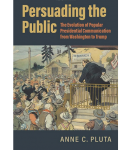Persuading the Public presents an alternative theory of opportunistic communication in this comprehensive assessment of the popular communication practices of American presidents from 1789 to 2021.
To the Senate of the United States:
I herewith transmit to the Senate a report** from the Secretary of State, with accompanying papers, in answer to their resolution of the 27th instant.
JOHN TYLER.
**Transmitting correspondence between the United States minister at London and the British Government in relation to certain slaves taken from the wreck of...

Persuading the Public presents an alternative theory of opportunistic communication in this comprehensive assessment of the popular communication practices of American presidents from 1789 to 2021.
Three questions for any Presidential Thanksgiving Proclamation:
"Before he enter on the Execution of his office, he shall take the following Oath or Affirmation: I do solemnly swear (or affirm) that I will faithfully execute the Office of the President of the United States, and will to the best of my Ability, preserve, protect and defend the Constitution of the United States." (US Constitution, Article II, Section 1)
"He . . .by and with the Advice and Consent of the Senate, shall appoint Ambassadors, other public Ministers and Consuls, Judges of the supreme Court, and all other Officers of the United States, whose Appointments are not herein otherwise provided for, and which shall be established by Law. . . (U.S. Constitution, Article II, Section 2)
"He shall from time to time give to Congress Information of the State of the Union. . .he shall take Care that the Laws be faithfully executed and shall Commission all the Officers of the United States." (U.S. Constitution, Article II, Section 3)
Starting in the late 20th Century, Presidents consistently emphasize recognition of a wide variety of cultural groups.
Presidents have been central in establishing and modifying our practices for Memorial Day.